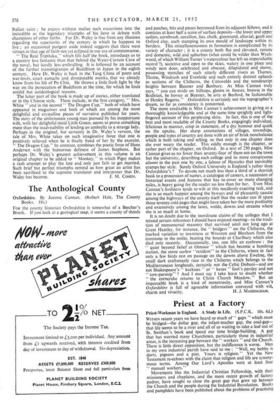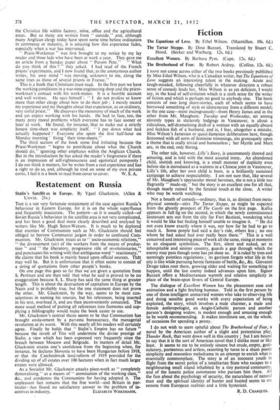Priest at a Factory
Priest-Workman in England. A Study in Life. (S.P.C.K. 10s. 6d.) WITHIN recent years we have heard so much of " gaps " which must be bridged—the dollar gap, the infant-teacher gap, the coal-gap- that life seems to be a river and all of us waiting to take a leaf out of St. Swithun's book and spend our time bridge-building. A gap that has worried many Churchmen, particularly those in industrial areas, is the increasing gap between the " workers " and the Church. There is little direct opposition, but the indifference is worse. Men in my own industrial parish have said to me : "Well, my hobby is darts, pigeons and a pint. Yours is religion." Yet the New Testament re-echoes with the claim that religion and life are synony- mous terms. Among Our Lord's Apostles were at least four " manual workers." Movements like the Industrial Christian Fellowship, with their missioners and chaplains, and the more recent growth of factory padres, have sought to close the great ,gap that grew up between the Church and the people during the Industrial Revolution. Books and pamphlets have been published about the problems of practising the Christian life within factory, mine, office and the agricultural areas. But so many are written from " outside," and, although many Anglican clergy today have spent some time before ordination in commerce or industry, it is amazing how this experience fades, especially when a war has intervened.
" Priest-Workman " was first brought to my notice by my lay reader and three lads who have been at work a year. They gave me an article from a Sunday paper about " Parson Pete." " What do you think of this ? " they asked. I had read of the French priests' experiments, and I now found that, as the anonymous author writes, his own mind " was moving, unknown to me, along the same lines as those of several priests in France."
This is a book that Christians must read. In the first part we have the working conditions in a war-time engineering shop and the priest- workman's contact with his work-mates. It is a humble account and well written. He says himself : " I do, not profess to know more than other clergy about how to do their job ; I merely record my experience and my thoughts about that experience, as an ordinary, very sinful priest." He discovers the monotony of much of the work and yet enjoys working with his hands. He had to face, too, the many petty moral problems which everyone has to face sooner or later at work. He found, for instance, that to make out a strictly honest time-sheet was simplicity itself. " I put down what had actually happened ! Everyone else spent the first half-hour on Monday morning ` fixing ' their time-sheets."
The third section of the book some find irritating because the Priest-Workman " begins to pontificate about what the Church should do," ignoring other emphases within the Anglican Church. But in the introduction he has asked the reader's forgiveness if there is an impression of self-righteousness and egotistical pomposity I I do not think it matters, for he writes from a real experience and has a right to do so, and, although he trod on some of my own private corns, I feel it is a book to read from cover to cover. W. S. A.



































 Previous page
Previous page